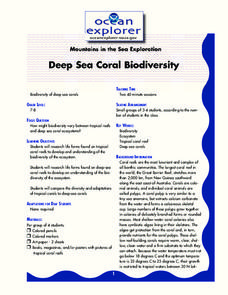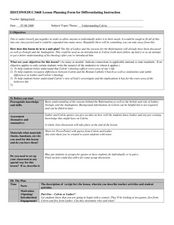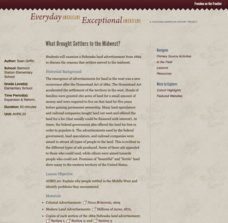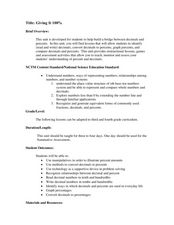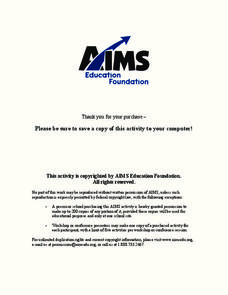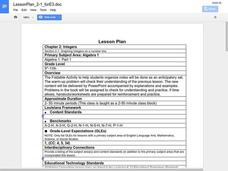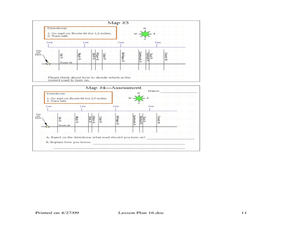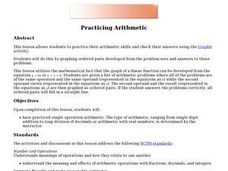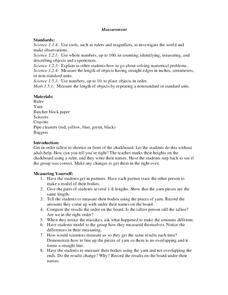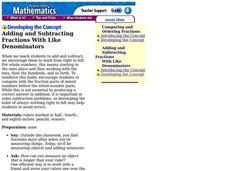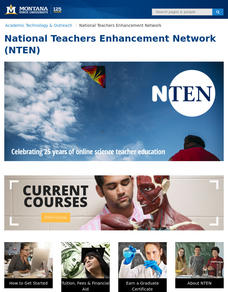Curated OER
Deep Sea Coral Biodiversity
Learners research life forms on tropical coral reefs in order to explore the biodiversity of the ecosystem. In this biodiversity lesson plan students work in groups and complete their coral reef activity.
Curated OER
Understanding Calvin
Students examine the vision of John Calvin. In this Calvinism lesson plan, students compare Calvin's religious ideology with that of Martin Luther as well as the Catholic Church. Students discuss the lecture they listen to and write...
Roy Rosenzweig Center for History and New Media
What Brought Settlers to the Midwest?
Drawn by promises of fertile land, thousands of settlers poured West because of the Homestead Act of 1862. By examining images of the ads that drew them westward, learners consider the motivations for movement. They also consider how the...
Curated OER
Giving it 100%
Learners build knowledge about the number relationships between decimals and percents as it relates to converting decimals into percents. In this decimal and percent lesson, students recognize equivalent forms of fractions,...
Curated OER
How using number patterns help us add or subtract
Second graders use a number line to understand multiples. In this number line lesson, 2nd graders use a floor size number line and calculate problems with multiples. Students complete a worksheet with multiples.
Curated OER
Bears Wear Buttons
Students practice counting sets of objects and numerals. In this numerical identification lesson, students listen to the story, Bears Wears Buttons, and participate in a flash card activity where students must place buttons on...
Curated OER
Salaries
Students are engaged in the study of salaries and how they vary according to different occupations. They conduct research using a variety of resources in order to summarize the earnings potential in the human services field.
Curated OER
The Body Meter
Students are introduced to the measurement of a meter. They measure and compare the height of different people in the class. Students classify the measurements into categories of tall, short, and average while conducting class discussion...
Curated OER
Multiplication Lesson
Fourth graders use grid paper, M&M's, and vocabulary words, to correctly complete multiplication problems. In this multiplication lesson plan, 4th graders complete number sentences, use symbols, solve equations, and more.
Curated OER
Integers
Students graph integers on a number line. For this integers lesson, students create a colored foldable to assist them with notetaking and problem solving. Students complete exercises from text.
Curated OER
Where Should You Turn?
Fourth graders complete activities to study decimal numbers. In this decimal numbers lesson, 4th graders study decimal numbers to express numbers less than one and intervals. Students complete map and location activities to study the...
Curated OER
Plotting with Pennies
Fifth graders use pennies to gather data, organize and order data, graph the data on a stem-and-leaf plot, and evaluate the range, median, and mode of the data.
Curated OER
Making Rectangles
Learners study rectangles. In this math lesson, students use numbers, measurements and geometry to draw rectangles of varying sizes.
Curated OER
Piece of the Sky: Introduction for Making S'COOL Observations
Students observe and discuss cloud cover. They identify percent of cloud cover, calculate cloud cover by fraction and convert to a percent, and compare their models with the current real sky cloud cover.
Curated OER
Practicing Arithmetic
Students practice single operation arithmetic ranging from single digit addition to long division of decimals or real numbers using Graphit. They use data sets and rules to graph ordered pairs.
Curated OER
100 More 100 Less
Third graders review the concept of place value and number sense. With a partner, they are given four cards with numbers on them. Using the cards, they practice making new numbers and completing addition and subtraction to find the...
Curated OER
Measurement Activity
Students line themselves up from smallest to tallest at the chalkboard with the teacher marking their heights. After recording their names on the board next to their mark, they work with a partner to measure their height using several...
Curated OER
Identifying trophic levels and the skeletal system through Owl Pellets
Students identify a food chain sequence. They compare, identify, and record the rodent skeletal parts to a rodent skeletal diagram. Students construct a rodent skeleton from the skeletal parts found in the pellet. They are given the...
Curated OER
Pizza, Pizza
Fourth graders investigate the concept of fractions. A pizza is used as a metaphor and example of practice for students. They use the appropriate methods of dividing numbers from a whole and into the fractional parts. Then students...
Curated OER
Mathematics Within: Algebraic Patterns
Pupils discover patterns in linear equations by playing a dice game to collect data. They graph the data and analyze the patterns of the lines created by the data. The class then compares the individual graphs to evaluate the position of...
Curated OER
The Box with the Greatest Volume
Young scholars use measurement tools to measure the nearest 16th of an inch. They connect fractions and their decimal equivalents and compare this with other decimals. Finally, the class uses algebraic concepts and formulas to solve...
Curated OER
Adding and Subtracting Fractions with Like Denominators
Students add or subtract fraction parts of mixed numbers before adding or subtracting the whole number parts. In this fractions lesson, students learn to use a ruler to help them add and subtract fractions with like denominators.
Curated OER
Coin Content
Learners calculate ancient Greek coin values as compared to their weight, and equivalence in grain. They then determine their worth today. They convert metric to U.S. customary weight systems.
Curated OER
Predicting Monthly Precipitation
Students should log onto, and collect data from, a specific site on the Internet. They average and compare the data using the Excel spreadsheet program, make predictions from their data, and determine the percent error of their predictions.


